网站流量分析
网站搭建起来之后,总是要维护的,而网站的流量分析是其中一项比较重要的任务,通过网站的流量分析我们可以得到诸如"每天多少人访问?",“哪个页面访问的最多?”, “某个页面访问了多久?",“PC端多还是手机端多?“的答案。
网站的流量分析,大致可从以下三个方面入手。
- 访问日志
- 用户在页面的停留和点击行为
- 搜索引擎
请求日志
网站的访问日志是现成的数据集,很容易得到流量的方方面面,日志分析有很多工具,也很容易写脚本,这里主要介绍一个工具和一个简单的python脚本。
GoAccess
GoAccess一个开箱可用的分析工具,当安装之后只需要一条命令即可实时分析和输出分析结果。
如果已安装GoAccess, 使用以下命令。
这里分析的caddy的日志,caddy的日志格式和nginx有点不同,GoAccess从1.4.4才开始支持caddy的日志格式!!!
goaccess --log-format CADDY localhost.log -o /path/to/you/webroot/goaccess.html
注意: 上述命令将goaccess.html放到了网站根目录, 所以可以直接访问httos://{你的域名}/goaccess.html进行访问。
显示效果如下:
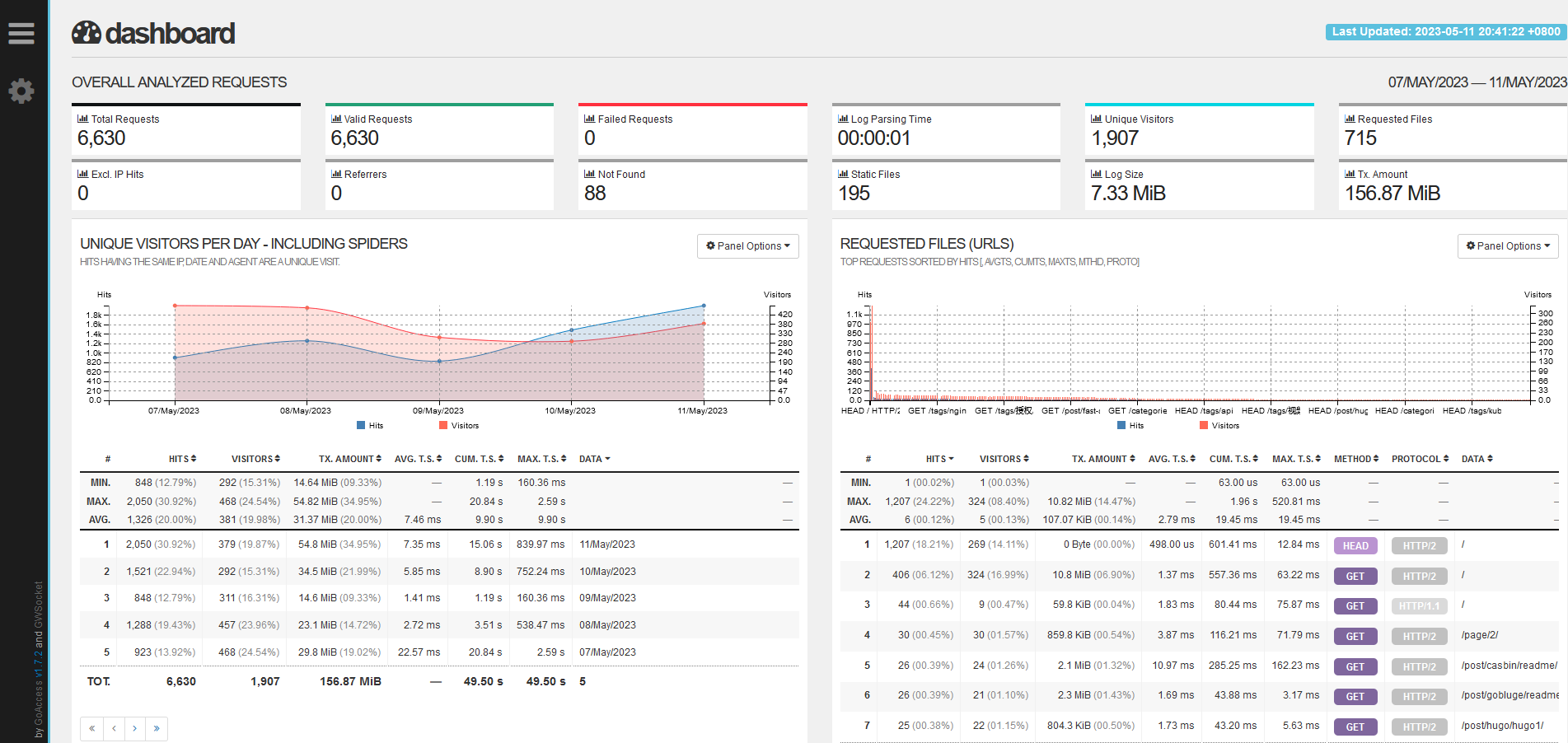
GoAccess官方的在线演示页面: https://rt.goaccess.io/
除此之外,GoAccess最常用的命令其实是在终端显示统计结果,命令如下,即不需要out参数。
goaccess --log-format CADDY localhost.log
这是终端的显示效果
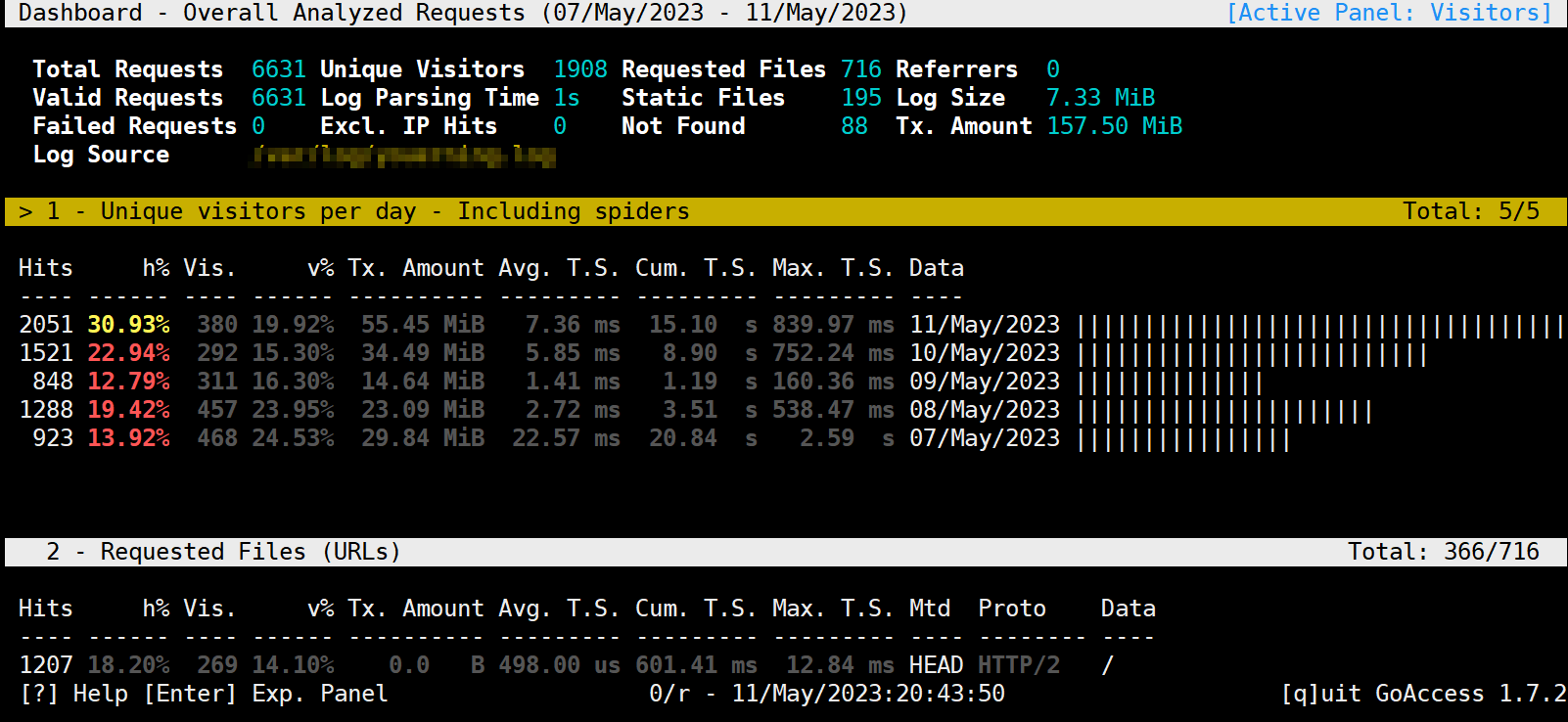
注意: 终端显示可以按下键不断下拉.
如果你愿意的话,也能实时出事网页预览结果, 命令如下
goaccess --log-format CADDY localhost.log -o /path/to/you/webroot/goaccess.html --real-time-html
GoAccess的安装使用可查阅官方文档,这里就赘述了。
GoAccess下载安装: https://goaccess.io/download
GoAccess使用说明: https://goaccess.io/man
Python脚本
使用脚本分析访问日志还是很容易的,相较于其他解决方案而言不成熟, 不过优点是灵活。
caddy的一条日志如下:
{
"level": "info",
"ts": 1683809163.1758618,
"logger": "http.log.access.log1",
"msg": "handled request",
"request": {
"remote_ip": "172.69.67.51",
"remote_port": "63594",
"proto": "HTTP/2.0",
"method": "HEAD",
"host": "youerning.top",
"uri": "/",
"headers": {
"Cdn-Loop": ["cloudflare"],
"Cache-Control": ["no-cache"],
"Cf-Ipcountry": ["US"],
"X-Forwarded-For": ["216.144.248.23"],
"X-Forwarded-Proto": ["https"],
"Accept": ["text/html,application/xhtml+xml,application/xml;q=0.9,*/*;q=0.8"],
"Referer": ["https://youerning.top"],
"Accept-Encoding": ["gzip"],
"Accept-Language": ["en-US,en;q=0.8"],
"Cf-Connecting-Ip": ["216.144.248.23"],
"Cf-Ray": ["7c5a85c508a6aa34-DFW"],
"Content-Length": ["0"],
"Cf-Visitor": ["{\"scheme\":\"https\"}"],
"User-Agent": ["Mozilla/5.0+(compatible; UptimeRobot/2.0; http://www.uptimerobot.com/)"]
},
"tls": {
"proto": "h2",
"server_name": "youerning.top"
}
},
"user_id": "",
"duration": 0.001344724,
"size": 0,
"status": 200,
"resp_headers": {
"Content-Length": ["30986"],
"Server": ["Caddy"],
"Alt-Svc": ["h3=\":443\"; ma=2592000"],
"Etag": ["\"ruhtxgnwq\""],
"Content-Type": ["text/html; charset=utf-8"],
"Last-Modified": ["Thu, 11 May 2023 12:12:52 GMT"],
"Accept-Ranges": ["bytes"]
}
}
一般来说,我们比较在意请求路径和User-Agent, 而User-Agent只能简单的判断一下是否是爬虫, 因为大多数爬虫知道改User-Agent…
脚本如下:
import json
import time
from urllib.parse import urlparse
from collections import Counter
from datetime import datetime, timedelta
from ua_parser.user_agent_parser import Parse as ua_parse
LAST_HOURS = 24 * 7
now = datetime.now()
analysis_start_time = now - timedelta(hours=LAST_HOURS)
user_agents = Counter()
# client_ips = Counter()
# hosts = Counter()
uris = Counter()
referers = Counter()
# statuses = Counter()
# durations = Counter()
with open(sys.argv[1], encoding="utf8") as rf:
while True:
ts = None
line = rf.readline()
if not line:
break
# 处理format没有指定为json时的日志
if line.startswith("2"):
start_index = line.find("{")
if start_index == -1:
print(f"日志格式错误(无法找到'{{'起始位置位置): {line}")
continue
ts_index = line.find(".")
if ts_index == -1:
print(f"日志格式错误(解析时间格式): {line}")
continue
try:
# 2023/05/09 09:06:17.323
ts = time.strptime(line[:ts_index], "%Y/%m/%d %H:%M:%S")
ts = datetime(ts.tm_year, ts.tm_mon, ts.tm_mday, ts.tm_hour+8, ts.tm_min, ts.tm_sec, 0)
except Exception as exc:
print("错误的时间格式: ", exc, line)
continue
line = line[start_index:]
try:
record = json.loads(line)
except Exception as exc:
print(f"日志格式错误(解析json格式失败): {line}", exc)
if not ts:
ts = datetime.fromtimestamp(record["ts"])
if ts< analysis_start_time:
continue
request: dict = record.get("request")
if request.get("headers").get("User-Agent"):
user_agent = request.get("headers").get("User-Agent")[0]
else:
user_agent = "Unknow"
referer = request.get("headers").get("Referer")
if referer:
referer = referer[0]
try:
referers.update([urlparse(referer).netloc])
except Exception as exc:
print("解析referer失败:", referer, exc)
user_agnet = ua_parse(user_agent).get("user_agent").get("family")
user_agents.update([user_agent])
# client_ips.update([request.get("remote_ip")])
# hosts.update([request.get("host")])
uris.update([request.get("uri")])
# statuses.update([record.get("status")])
# durations.update([record.get("duration")])
print("user agent: \n%s" % "\n".join([f"{n[0]}|{n[1]}" for n in user_agents.most_common(5)]))
print("uris: \n%s" % "\n".join([f"{n[0]}|{n[1]}" for n in uris.most_common(5)]))
print("referers: \n%s" % "\n".join([f"{n[0]}|{n[1]}" for n in referers.most_common(5)]))
结果输出如下:
user agent:
Edge/12.246|1631
Mozilla/5.0+(compatible; UptimeRobot/2.0; http://www.uptimerobot.com/)|1201
Chrome/74.0.3729.169|608
Chrome/104.0.0.0/537.36|440
Firefox/112.0|275
uris:
/|1664
/favicon.ico|90
/js/menu.js|80
/css/style.css|76
/page/2/|35
referers:
youerning.top|3569
www.google.com|11
blog.51cto.com|3
youerning.top:8080|2
baidu.com|2
其他方案
ELK/EFK
如果手上资源足够并且应用众多,访问日志众多,可以搜索一下ELK, EFK等关键词来找到安装及使用文档,并通过它们来分析日志。这两个方案几乎是完全解决方案了,大小通吃,不过维护成本要大很多。
Loki + Grafana
这个方案没亲自使用过,但是看官方文档介绍觉得还是很不错的。
用户在页面的停留和点击行为的统计分析
访问日志虽然记录了用户的请求,但是无法直观的反应用户在页面花费的时间,比如页面停留了多久,比如是否滚动鼠标(滚动了鼠标,说明可能在看网页内容)等等,所以我们需要一些额外的工具来分析用户的访问行为,这些工具可选的很多,最出名的应该就是Google Analytics和百度统计了,不过笔者暂时还没接入百度统计,所以这里着重说明一下Google Analytics.
Google Analytics
这是笔者的建站至今的分析数据(截止到2023/05/11还没一周…)
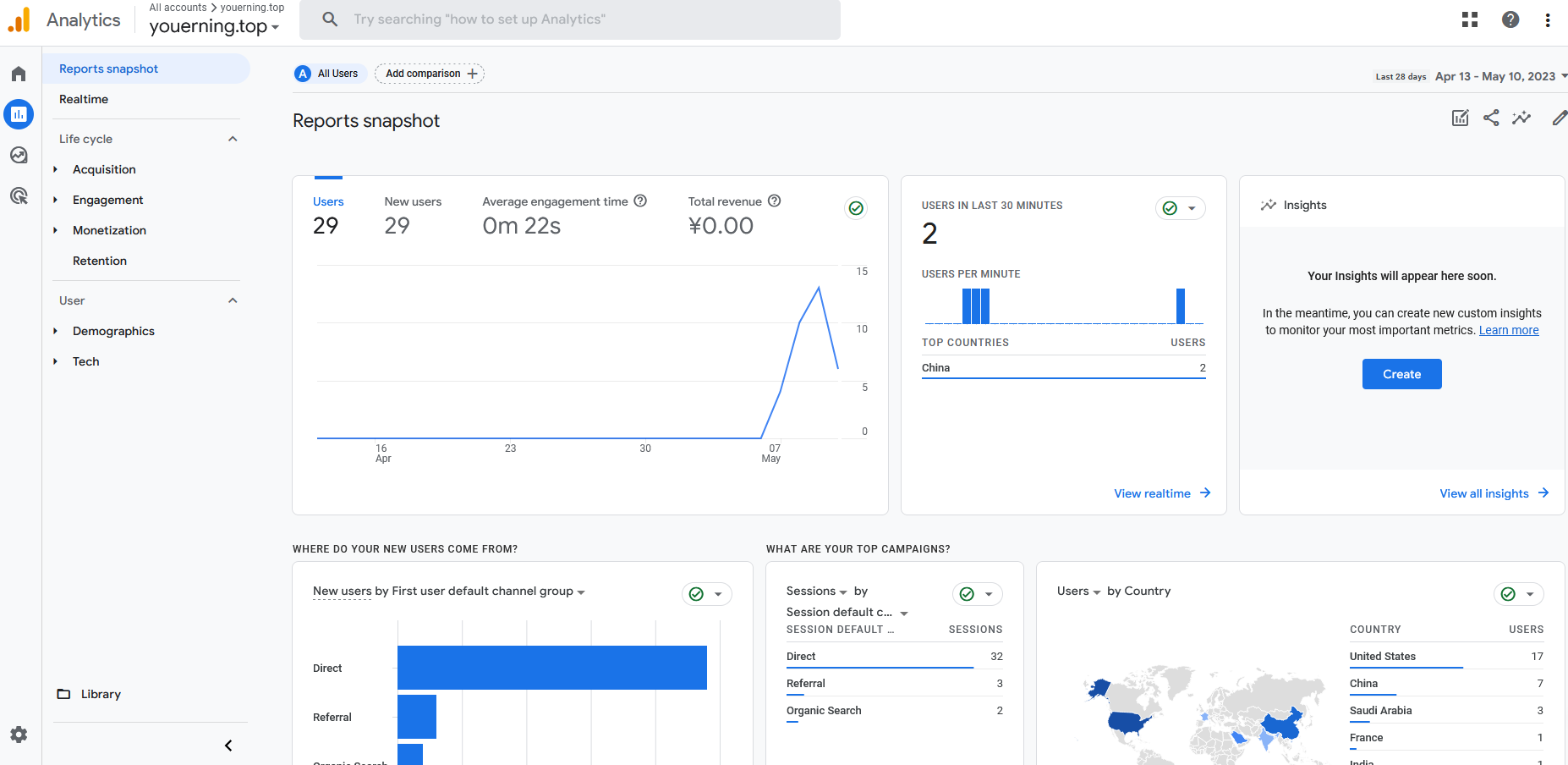
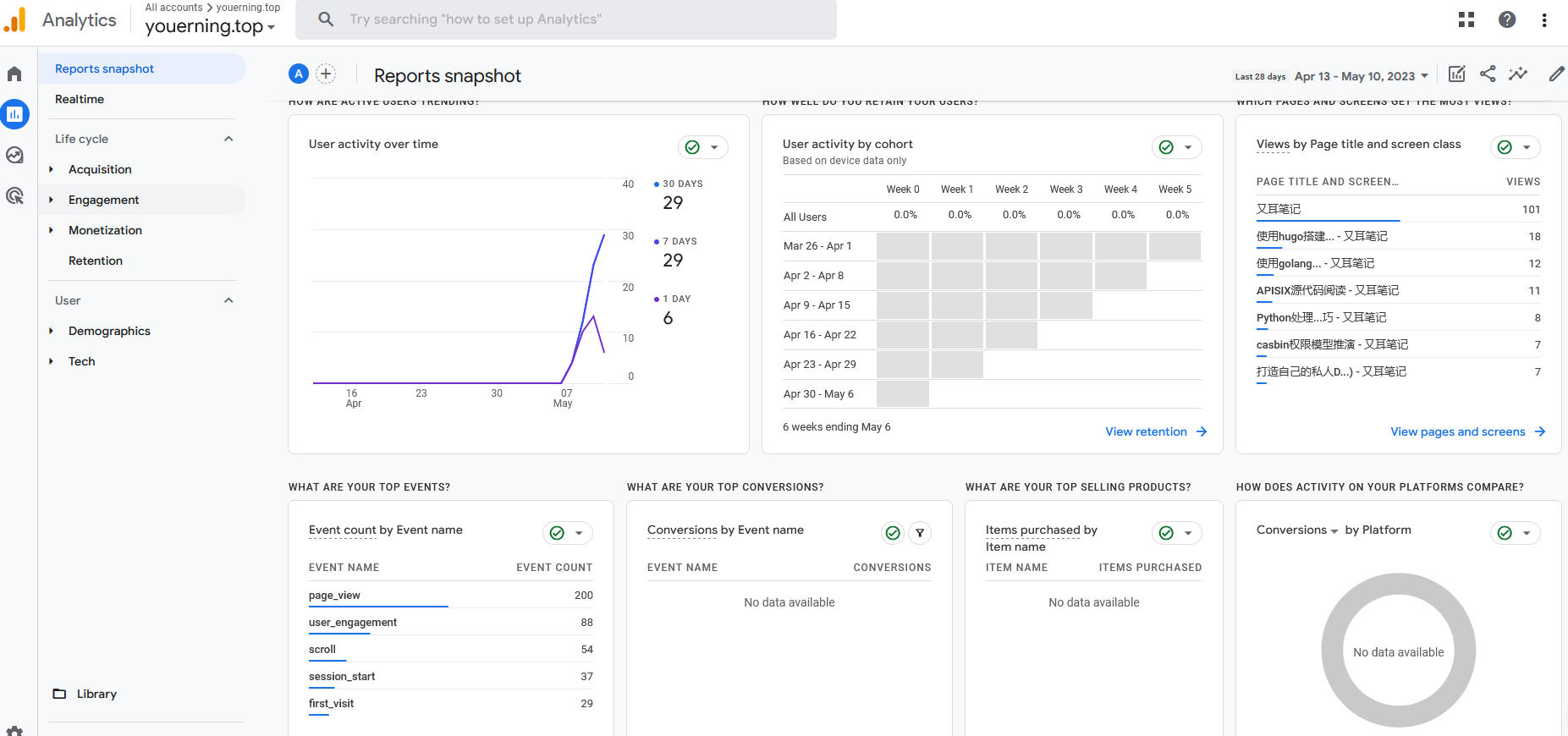
从Google Analytics 报告可以看到用户走势, 用户地区分布, 用户事件, 访问页面统计等等。
像这种大公司的服务好处在于,不用担心Google Analytics会停止服务,但是有两点需要注意,一是Google作为国外服务商,在国内那就是可能会被墙,二是有的浏览器插件会屏蔽加载Google Analytics的JavaScript,所以统计数据并不能完全说明自己的网站情况,不过这么好的东西,还免费,有啥可抱怨的。
其他方案
百度统计
百度一般有Google对应的产品,对应Google Analytics的产品叫做百度统计,百度统计自然是不错的,不过我暂时还没使用,所以就只是在这里列出来。
Piwik
开源的解决方案,现在有一个新名字了,叫做Matomo。 缺点是需要自己维护(开源自然是这样.),这有一定的维护成本,好处自然是什么都可控,并且不容易被屏蔽。
小结
有的网站因为业务性质可能不能全面使用外部的分析工具,所以可以选择自己维护一个类似的分析服务。
搜索引擎的入口统计分析
这个能选的就不多了,Google, Baidu, Bing应该占据几乎整个搜索市场份额了吧, 所以看自己的需求来选择吧,当然了,全选肯定也是没有问题的,笔者暂时只在Google的搜索控制台认领了自己域名youerning.top,认领不是太复杂,用Google账号登录 控制台登录页面即可。
下面看看youerning.top这个建站不到一周的搜索数据和页面收录情况。
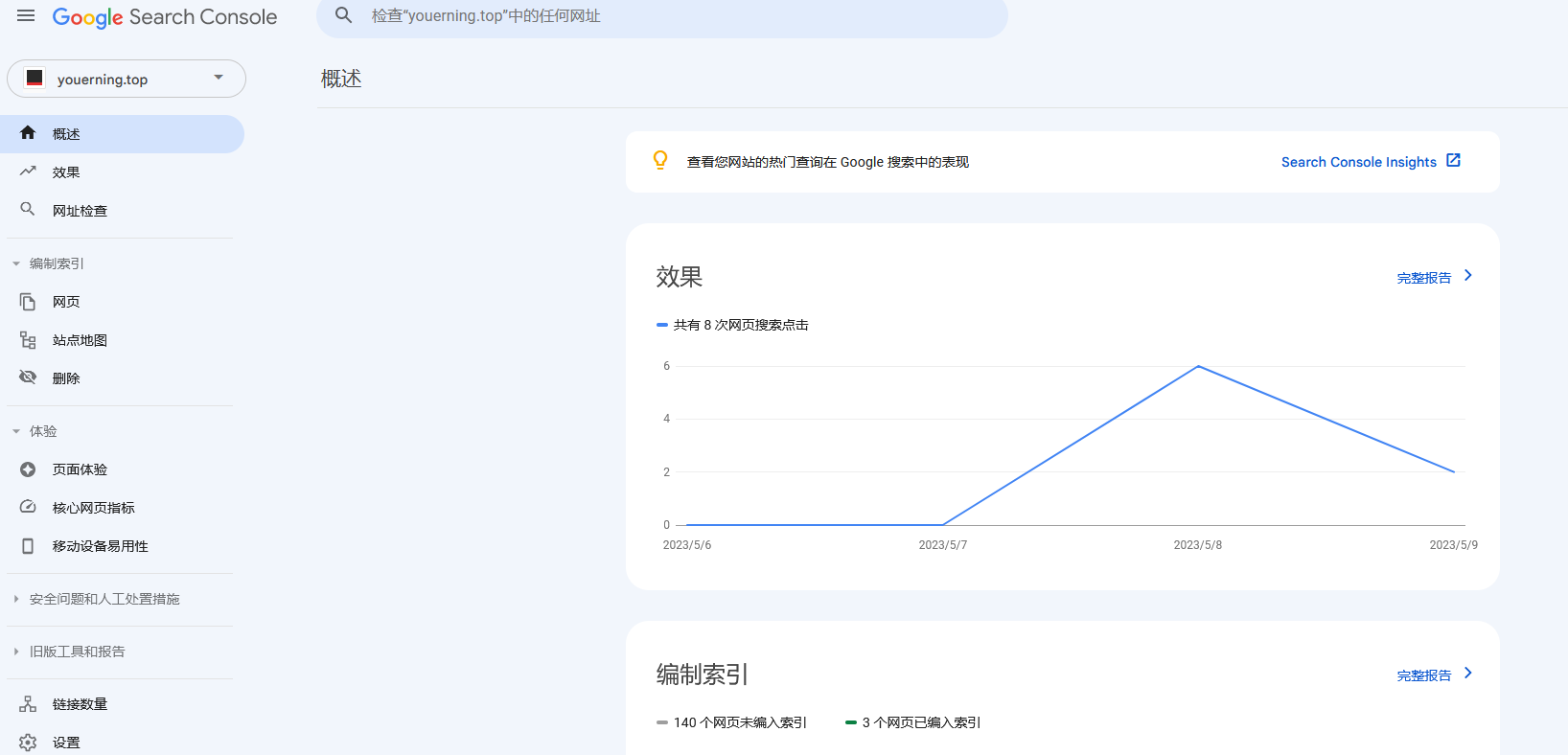
可以看到还有140个页面没有收录, 但是实际搜索中发现不止三个。
而它的效果页面我们可以看到页面在被搜索后的点击率。
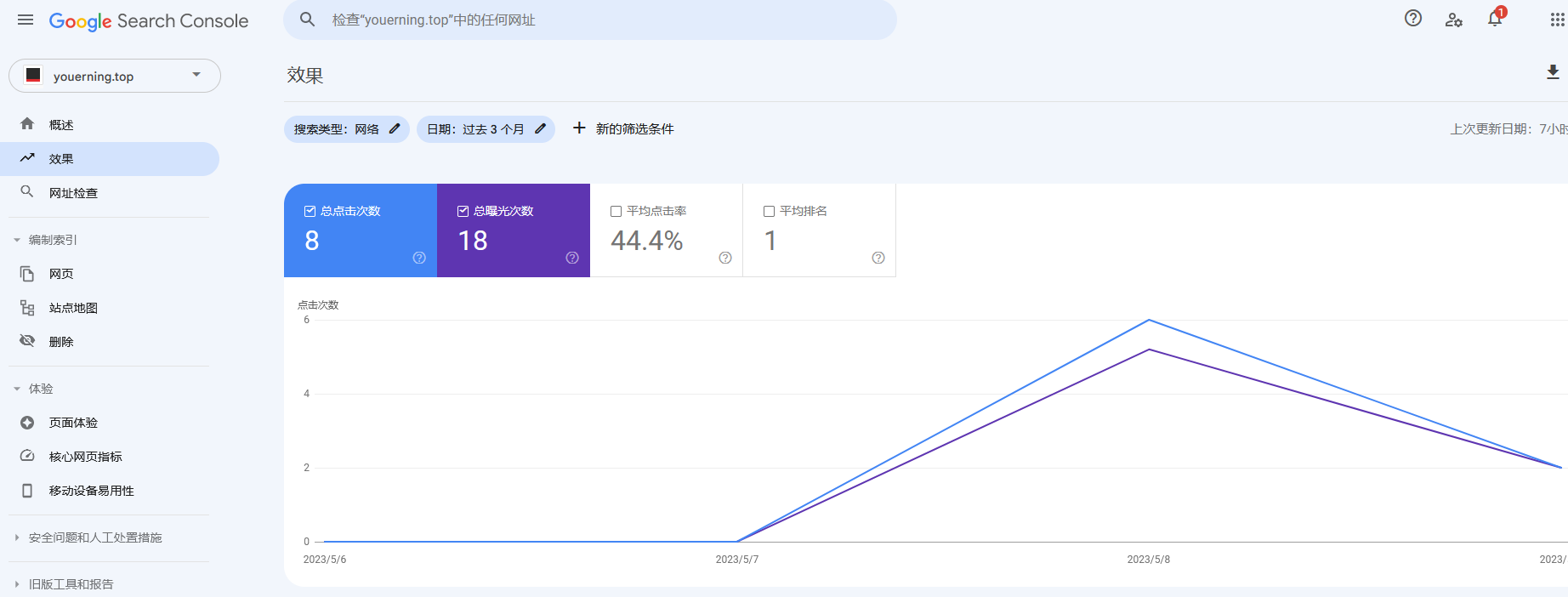
加个&hl=zh-Hans将显示改成中文!!!
除了登录搜索控制台,还可以直接在搜索页面查看网页的收录情况。

看截图发现一共收录了7个网页。
总结
将网站搭建起来只是万里长征第一步,如果对自己的网站有一定要求必然是需要持续的付出维护成本的,不过都2023年了,免费的,开源的,太多太多,大大的减轻了维护网站的成本。
终于我也称为一名站长了(好老好老的词了呀,当然了, 我也可以说是自媒体^_^)。
